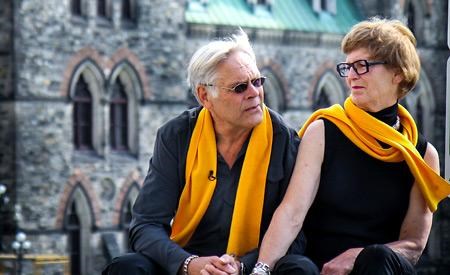When thinking about death, most probably imagine a peaceful passing or even a blissful afterlife. For many people, however, the process of dying is anything but untroubled and dignified.
That’s why BC Civil Liberties Association (BCCLA) went to the Supreme Court of Canada on October 15 to argue in the case of Carter versus Canada that the federal laws that criminalize doctors for helping competent, seriously ill individuals who wish to hasten their own death are unconstitutional. The BCCLA presented the case that allowing physicians to assist terminally ill patients to end their lives is a fundamental human right and an integral part of a compassionate society.
“The overwhelming majority of Canadians believe that people should have the right to determine how much suffering to endure at the end of life and whether to seek a doctor’s assistance to hasten death if living becomes unbearable,” said Grace Pastine, litigation director for BCCLA. “Canadians who suffer from diseases such as terminal cancer, Lou Gehrig’s disease, Huntington’s disease, and multiple sclerosis should be able to choose a compassionate death. People want and deserve the right to make deeply personal decisions about their own bodies and their own lives. Now is the time for Canada’s highest court to decriminalize physician-assisted dying and give seriously ill patients the compassion and dignity they deserve.”
Two of the plaintiffs in the case were Gloria Taylor and Kathleen (“Kay”) Carter. Both were terminally ill with degenerative diseases and facing pain, suffering and loss of even the smallest detail of personal autonomy. Their case was supported by a number of people who told their own stories, including a woman who considered suicide by asphyxiation, drug overdose or freezing herself to death rather than suffer the end stage agonies of cancer; a man with ALS who had been told he was “on his own” when he tried to discuss the options he would have once his disease progressed; a man with Huntington’s disease whose mother with the same inherited condition killed herself by starvation to avoid further suffering; and a woman whose husband begged her to shoot him to relieve him from the anguish he was in due to ALS.
Suicide has been legal in Canada since 1972, but many people incapacitated by severe illness don’t have the strength or coordination to act alone. It makes sense for them to be able to enlist the services of a doctor to ease their suffering. Federal laws don’t permit that. It is an indictable offence punishable by up to 14 years in prison for anyone, including a doctor, to aid or abet a person to commit suicide. Severely incapacitated terminally ill people who have made the decision to free themselves from the horrific tribulations of their conditions are forced to resort to self-starvation, over-medication and even violent methods, which can prolong and increase suffering and anguish.
“The fact is that the current laws have the perverse effect of forcing seriously ill Canadians to resort to violent methods or the ‘back alley,’” said Pastine. “Tragically, people will find ways to end lives that have become unbearable, even if that means choosing a violent, risky death...Regulation of choice in dying, rather than the criminalization of doctors, provides the best protection for seriously ill Canadians.”
This is not the first time that this issue has reached Canada’s highest court. In 1993 Sue Rodriguez, a terminally ill mother, challenged the prohibition of assisted suicide as contrary to the Charter of Rights and Freedoms. In a five-to-four decision, the court upheld the criminal code provision, but the dissenting justices raised significant questions about whether the Charter rights guaranteeing security and equality and prohibiting cruel and unusual treatment were violated.
Much has changed since 1993. Today, assisted suicide is legal in Switzerland, Germany, Belgium, Colombia, Japan and Albania, and in Washington, Oregon, Vermont, New Mexico and Montana in the United States. The fears that governments would push assisted suicide to reduce health care costs or that there would be pressure on elderly people who felt they were a burden to their families have not proven out. Prominent humanists, including Nobel Peace Prize-winning Anglican Archbishop Desmond Tutu, have urged Canada to join those nations that recognize the fundamental right to be able to die with dignity.
In 2012, two decades after the Rodriguez case, BC Supreme Court agreed with Taylor and Carter that the law against assisted suicide infringed on equality, security and liberty rights. The rejoicing was short-lived, however, as that historic ruling was set aside by the BC Court of Appeal. The BCCLA appealed to the Supreme Court of Canada, which agreed to again consider the question of doctor-assisted suicide.
If the BCCLA case is successful, the right to physician-assisted suicide will be a personal choice only available in tightly regulated, exceptional circumstances such as those faced by Taylor and Carter. Neither will see the results of their work. Taylor died suddenly from an infection in 2012 and did not need to request medical assistance to end her life. Carter travelled to Switzerland to receive assistance in dying in 2010, because physician-assisted suicide was not available in Canada. She had to keep her plans secret and could not even risk saying good-bye to many people she loved.
“This has been a gruelling legal battle and we are hopeful that the court will agree with us that seriously ill Canadians deserve a dignified and peaceful exit, rather than being forced to live in fear about how they will die,” said Pastine. “The federal government has no place at bedsides of seriously ill Canadians who have made firm decisions about the amount of suffering they will endure at the end of life.”
Due to the courageous stands for basic liberties by these women and many others, Canadians will soon know whether those who are afflicted and suffering, like Taylor and Carter, will have the same right to a dignified death in Canada as those who are able-bodied.



